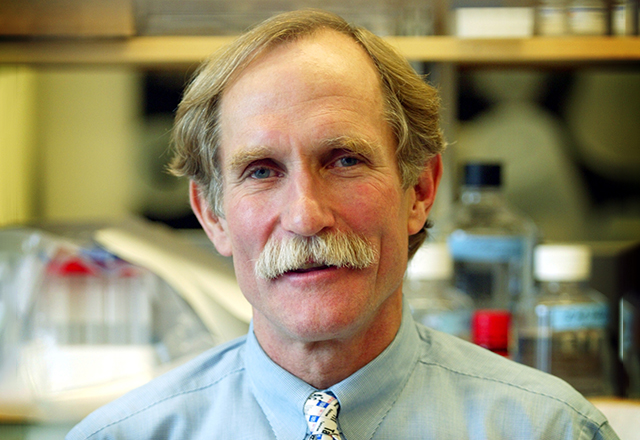Peter Agre, M.D., received the 2003 Nobel Prize in Chemistry for his discovery of what he called the aquaporin proteins, which form the channels that enable water to flow in and out of cells.
Agre shares the award with Roderick MacKinnon of Rockefeller University.
The Discovery
The Academy recognized him for his laboratory's 1991 discovery of the long-sought "channels" that regulate and facilitate water molecule transport through cell membranes, a process essential to all living organisms.
The discovery of the water channel, dubbed "water pore" or aquaporin, ushered in a golden age of biochemical, physiological and genetic studies of these proteins in bacteria, plants and mammals, and fundamental understanding -- at the molecular level -- of malfunctioning channels associated with many diseases of the kidneys, skeletal muscle and other organs. Working from this basic knowledge, scientists continue searching for drugs that can specifically target water channel defects.
How the Discovery Helps People
Since a 1992 paper in Science by Agre and Johns Hopkins physiologist Bill Guggino, Ph.D., that documented the discovery of the very first water channel protein, more have been found in mammals, and hundreds more in plants, bacteria and other forms of life. In Agre's lab alone, aquaporins were discovered to be part of the blood-brain barrier and also associated with critical water transport in skeletal muscle, lung and kidney. Members of Agre's lab also found aquaporins in the eye and in salivary and tear glands. Researchers around the world now study aquaporins in many species of plants, bacteria and animals, and have linked aberrant water transport to a multitude of human diseases and conditions.
I am certain that in the future, we will be able to capitalize on our understanding of aquaporins to benefit medicine, biotechnology and even agriculture. We still have much to learn, and the possibilities of where aquaporins will take us are unlimited.
Peter Agre, Nobel Laureate
Johns Hopkins and the Nobel Prize
-
29
Nobel laureates affiliated with Johns Hopkins
-
3
Nobel Prizes in chemistry
-
4
Nobel laureates currently at Johns Hopkins
How Johns Hopkins School of Medicine Changed My Life | Dr. Peter Agre
Nobel Prize-winning scientist Peter Agre, M.D., discusses how the collaborative environment of the Johns Hopkins University School of Medicine provides unlimited possibilities to inquisitive young scientists, just as it did for him as a student in the 1970s.
More about Dr. Agre
Related Articles and Press Releases
- Nobel Prize Winning Scientists Reflect on Nearly Sleeping Through the Life-Changing Call (The New York Times, 2015)



